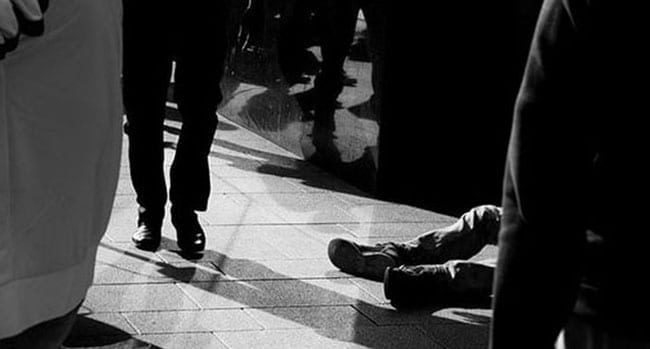 As humans, we need to sleep. Yet, on both sides of the border, “sleeping” can be considered a criminal act – especially if you are homeless and have no place to rest your head, other than in public spaces such as parks.
As humans, we need to sleep. Yet, on both sides of the border, “sleeping” can be considered a criminal act – especially if you are homeless and have no place to rest your head, other than in public spaces such as parks.
How have cities and states been able to impose and enforce bylaws and ordinances that clearly violate one’s right to occupy public space for this very purpose? This summer, several cases are putting this longstanding question to the legal test. The outcome of those legal decisions might just change the way we view homelessness.
In the City of Abbotsford, B.C., a civil court case is pitting a group known as the Drug War Survivors against the state in a fight over what is being viewed as further evidence of the criminalization of homelessness. The group’s lawyer has argued that his clients (and all homeless persons) have the right to occupy park space for the purpose of temporary dwelling and sleeping. The case argues that a set of bylaws prohibiting such uses of public spaces is unjust, given that there is no alternative.
Perhaps the real fight is also about who is responsible for the provision of adequate shelter in Canada, especially for those most in need.
Across the border, the U.S. Department of Justice has intervened in a case in the District Court of Boise, Idaho. The department argued that the act of sleeping, when there is no shelter available, should not be considered a criminal act. Among the nearly half a million annual homeless, 42 per cent slept in unsheltered public locations.
Interestingly, neither the Abbotsford case, nor the Boise filing, are new. Cities have always struggled with the inability to shelter all those in need. What is new, however, is the criminalization of homelessness.
The U.S. didn’t see a spike in the numbers of citizens without homes until the late 1970s. The causes: the economy, deinstitutionalization of persons from mental health facilities, and increasing numbers of veterans on the streets. For most jurisdictions, the fight was not about affordable housing but how to deal with the “vagrants” who shuffled about the streets. Citizens demanded steps be taken to end public intoxication, curb panhandling and the visibility of poverty, mental health and severe addiction.
In 1979, Supreme Court Judge Andrew Tyler delivered a landmark decision in the case of Callahan v. Carey. Robert Callahan was homeless and resided in the notorious Bowery neighbourhood of New York City. Justice Tyler’s brave decision was clear: the State was obligated to provide shelter to those most in need. His decision also included the clear articulation of necessary shelter standards and intake and monitoring provisions.
The decision required the State of New York to shelter those in need. The case would also impact other jurisdictions to consider whose responsibility it was to provide temporary shelter.
In the late 1990s, Toronto’s Tent City plight became ground zero for a Canadian resistance movement that drew in many, including the late Jack Layton, a then-city councillor. He grappled with the same question: Who is responsible for the provision of adequate shelter in Canada during a time of crisis? The Toronto story ended with a mass eviction on the occupied private lands while a media storm brewed among social housings activists, governments and citizens, all fighting over how shelter should be provided and what rights Canadians have to occupy land.
The Tent City movement did not result in the legal outcomes of Callahan v. Carey, but it did see the federal government acknowledge the homeless crisis with an investment of nearly $1 billion in funding to overhaul Canada’s inadequate shelter system.
As the North American summer simmers with high temperatures evoking heat warnings, several legal proceedings are quietly brewing. Perhaps the boiling point has been hit — with governments on both sides of the border on the verge of acknowledging the right of people to sleep in public spaces when no other option exists. Let’s hope these legal cases also determine this fundamental right cannot be deemed a criminal act. And let’s hope what follows is further government investment in the range of supports needed to end homelessness.
Jino Distasio is Director of the Institute of Urban Studies, University of Winnipeg.
Jino is a Troy Media Thought Leader. Why aren’t you?
The views, opinions and positions expressed by columnists and contributors are the author’s alone. They do not inherently or expressly reflect the views, opinions and/or positions of our publication.
